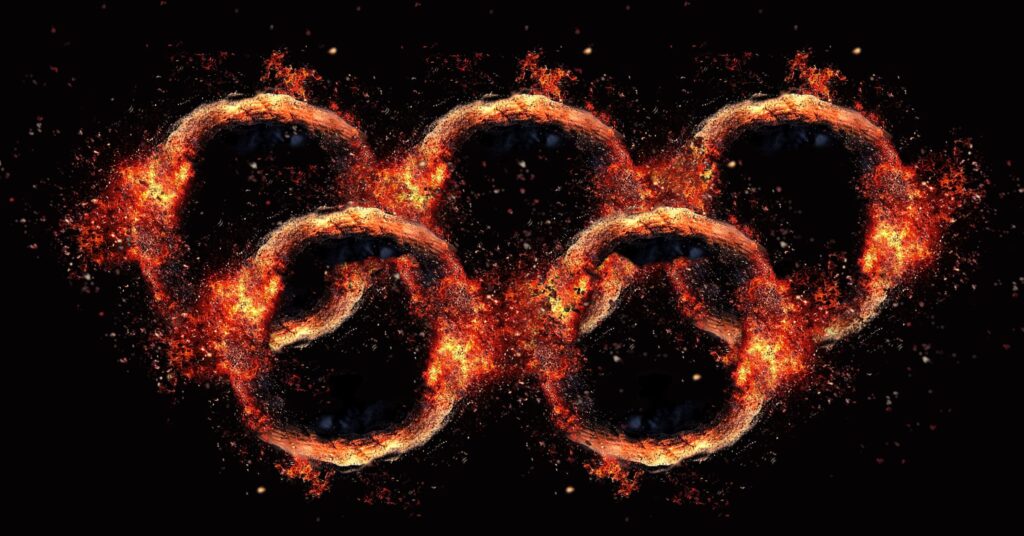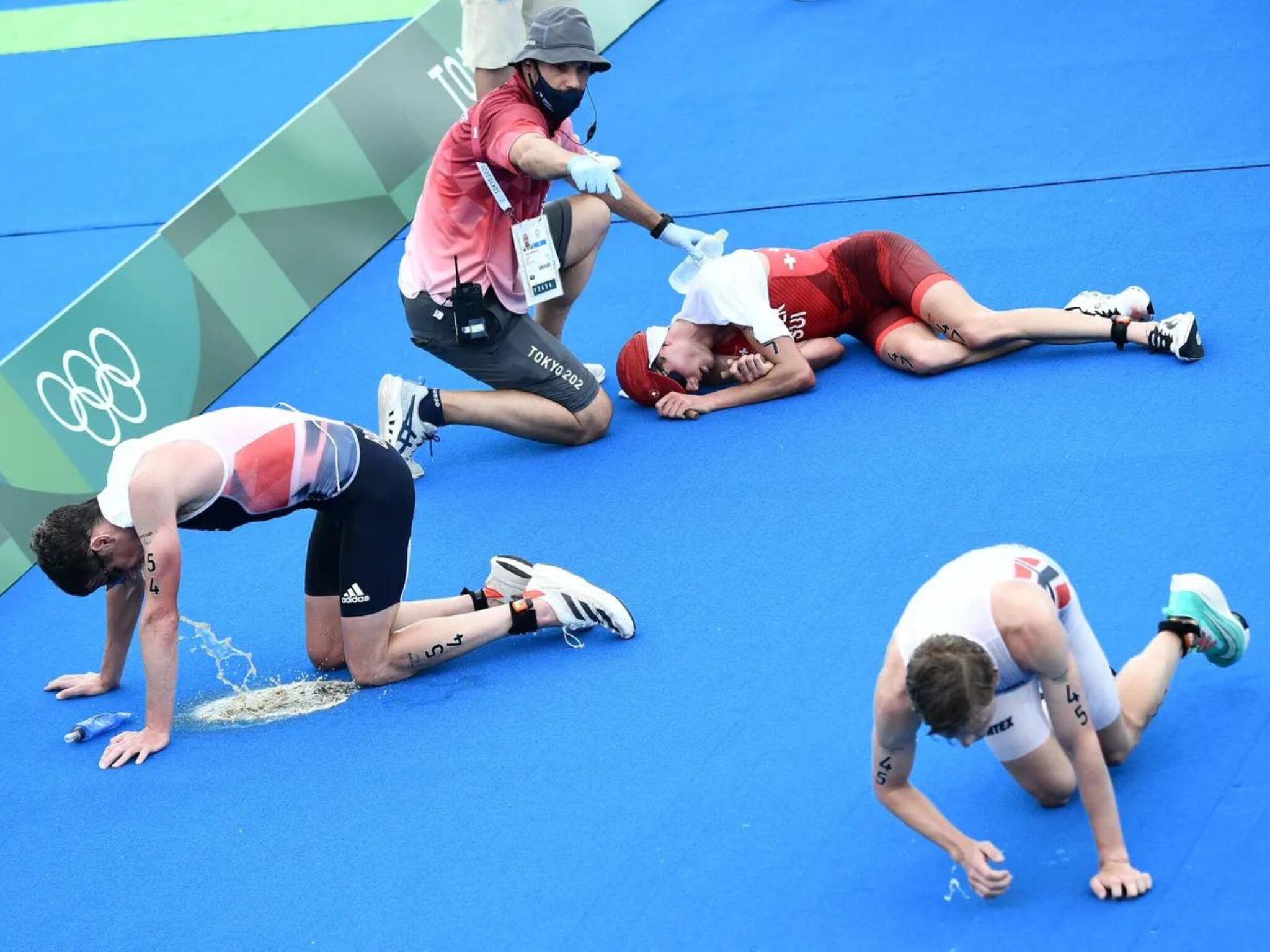Athletes Could Collapse or Even Die Due to Extreme Heat at Paris Olympics: Report
6 Mins Read
A group of athletes and climate scientists have warned that intense heat at the Paris Olympics – set to be the hottest games on record – could lead to competitors collapsing, or in worst-case scenarios, even dying.
In 2021, with temperatures above 34°C and humidity approaching 70%, the Olympic Games in Tokyo were described as the hottest in history. But that was just a glimpse into an “alarming, escalating” norm for the Summer Olympics, according to a new report by leading athletes and climate scientists.
“Competitors vomited and fainted at finish lines, wheelchairs were deployed to carry athletes away from sun-scorched arenas and the fear of dying on court was even raised mid-match by the Tokyo Games’ number two seeded tennis player Daniel Medvedev,” the report reads.
This summer’s games in Paris could potentially surpass these effects, with inaction on climate change and continued burning of fossil fuels contributing to record heat streaks in the past few months.
The Rings of Fire report is the result of a collaboration between 11 Olympians and climate scientists from the University of Portsmouth, who warn that the extreme heat forecasts in the French capital could lead to competitors collapsing and – in worst-case scenarios – even dying.
“A warming planet will present an additional challenge to athletes, which can adversely impact on their performance and diminish the sporting spectacle of the Olympic Games,” said Jo Corbett, associate professor associate of environmental physiology at the university’s School of Sport, Health and Exercise Science. “Hotter conditions also increase the potential for heat illness amongst all individuals exposed to high thermal stress, including officials and spectators, as well as athletes.”
Jamie Farndale, a rugby sevens player for Great Britain, added: “It is not in an athlete’s DNA to stop and if the conditions are too dangerous I do think there is a risk of fatalities.”
Worrying heat records threaten athletes at Paris Olympics

2023 was the hottest year on record, according to the EU’s Copernicus Climate Change Service. And that trend has continued in 2024, with the last 12 months being the warmest for the respective month since records began in 1940. Scientists predict there’s a 66% chance 2024 will be the hottest year on record.
Within Paris, meanwhile, annual temperatures have warmed by 1.8°C since 1924, the last time it hosted the Olympics. On average, there are 23 more ‘hot’ days of 25°C+, and nine more ‘scorching’ days of 30°C and above per year.
Between 1947 and 2023, the Paris area has seen 50 heatwaves, whose frequency and intensity have escalated as a result of climate change. In 2003, a deadly heatwave killed more than 14,000 people in France, and human-caused climate change has doubled the likelihood of that heatwave and increased the risk of heat-related deaths in central Paris by 70%.
At the time, the maximum recorded temperature in Paris was 39.5°C, but the capital has since registered 42.6°C – this was in 2019, when two heatwaves killed 1,435 people across France. And last summer, 5,000 people died due to the extreme heat in France. Research suggests that extremely hot summers like the one in 2023 are now 10 times more likely to occur because of climate change.
This year’s Olympics will be held around the same period (July 26 to August 11) of the year that saw the 2023 heatwave. Summer heat is further intensified in Paris due to the Urban Heat Island effect, whereby urban areas become warmer than surrounding rural regions.
The extreme heat has adverse effects on athletes’ abilities. Hot temperatures make it harder to regulate core body temperatures, which impairs performance, especially in endurance sports. Harmful impacts like sunburn, heat cramps, heat exhaustion and collapse from heat stroke are also causes for concern – the latter is a “serious medical condition that may have long-term, multi-organ consequences and may even be fatal”, the report states.
Sleep disruption is another major worry for athletes at the 2024 Olympics in Paris, especially given the lack of air conditioning in the Olympic Village. “From smaller performance-impacting issues like sleep disruption and last-minute changes to event timings, to exacerbated health impacts and heat-related stress and injury, the consequences can be varied and wide-ranging,” explained Sebastian Coe, president of World Athletics.
“I had symptoms similar to overtraining, but it was basically the heat exposure that ‘fried’ my nervous system,” said Swiss sprinter Ajia Del Ponte, recalling her fatigue from heat exposure at an event in Napoli in 2019. “I felt tired, exhausted mainly. Completely empty of energy to only lift my leg in skipping. I was devastated because I didn’t understand what was happening to my body. It feels like you have chains around your ankles and wrists that slow down every movement you do.”
Athletes afraid of speaking up
The International Olympic Committee has produced a consensus statement outlining a range of mitigation measures to protect the health of athletes, but it acknowledged extreme heat as a growing issue for sport globally.
“Challenges are mounting for athletes regarding air pollution, food and water insecurity and lack of shade. And, as this report makes especially clear, the challenges of climate-change-induced extreme heat for athletes are extensive and pose risks of devastating outcomes,” said Jackson Tuwei, president of Athletics Kenya.
The report urges the sporting community to address these concerns and listen to athlete voices about their safety and wellbeing over the effects of climate change. “I feel like we have brushed up against the true limit of what could be expected of athletes’ resilience a number of times, and I don’t believe there should have to be a series of heat-related deaths for us to put reasonable limitations in place,” said Marcus Daniell, a New Zealand tennis player who won bronze in the men’s doubles in Tokyo.
“The current environment is one of fear. Athletes don’t speak up or take action due to calls of hypocrisy – [the worry that they will be told] ‘shut up and play’,” said New Zealand hockey player Hugo Inglis, who will be competing at his fourth Olympics this summer. “My pipe dream is that sporting authorities/bodies would work with athletes to reshape the mainstream media narrative around sports and negative environmental externalities.”
The Rings of Fire report makes some key recommendations for sporting authorities, with inputs from Olympians. Organisers must take heat into account when scheduling events, avoiding the hottest parts of the day for exposed sports. They also must invest further in protecting competitors, support staff, fans, and workers – limiting heat exposure and implementing water breaks are no longer enough.
As Inglis suggested, many competitors are apprehensive about speaking up, but the report suggests that sporting authorities must empower them to talk about their experiences and the future impacts of climate change. By collaborating and speaking as one, sporting bodies and athletes can alter the narrative towards climate action and educate fanbases to follow suit.
Finally, sport needs to reexamine its relationship with the fossil fuel industry, the world’s top polluter. Sponsorships from companies in this sector may bring in much-needed finance, but the long-term costs of these partnerships must be reassessed.
The Paris Olympics has already addressed the second-most polluting industry, agriculture, by pledging to make 60% of all meals served at the games meatless. In fact, a third of the 13 million meals will be plant-based – twice more than last time.



